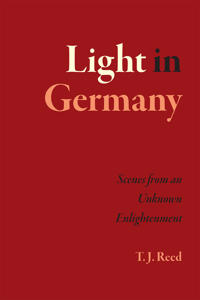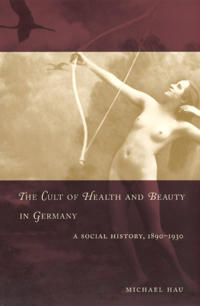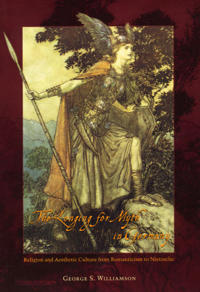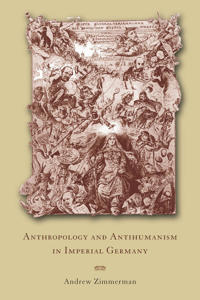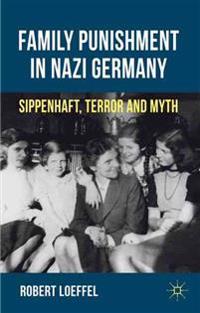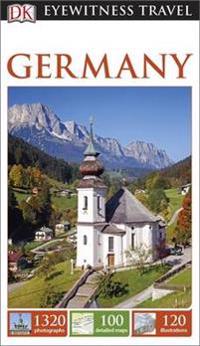Unwanted Child, The: The Fate of Foundlings, Orphans, and Juvenile Criminals in Early Modern Germany (Pocket)
avJoel F. Harrington
ISBN: 9780226102054 - UTGIVEN: 2013-10-18Light in Germany
ISBN: 9780226205106 - UTGIVEN: 2015-03Germany's political and cultural past, from ancient times through World War II, has dimmed the legacy of its Enlightenment, which these days is far outshone by those of France and Scotland. In this book, T. J. Reed clears the dust away from eighteenth-century Germany, bringing the likes of Kant, Goe[...]
The Cult of Health and Beauty in Germany (Häftad)
ISBN: 9780226319766 - UTGIVEN: 2003-06From the 1890s to the 1930s, a growing number of Germans began to scrutinize and discipline their bodies in a utopian search for perfect health and beauty. Some became vegetarians, nudists or bodybuilders, while others turned to alternative medicine or eugenics. In "The Cult of Health and Beauty in [...]
Light in Germany
ISBN: 9780226421834 - UTGIVEN: 2016-08Germany's political and cultural past from ancient times through World War II has dimmed the legacy of its Enlightenment, which these days is far outshone by those of France and Scotland. In this book, T. J. Reed clears the dust away from eighteenth-century Germany, bringing the likes of Kant, Goeth[...]
Moral Entanglements: Conserving Birds in Britain and Germany (häftad)
ISBN: 9780226543826 - UTGIVEN: 2018-04At the beginning of Stefan Bargheer's account of bird watching, field ornithology, and nature conservation stands a tiny island in the North Sea. The square-mile outcrop midway between Britain and Germany is the site for an impressive diversity of birdlife and a not less astonishing variety of ways [...]
Germany's Ancient Pasts
ISBN: 9780226592916 - UTGIVEN: 2018-11In Germany, Nazi ideology casts a long shadow over the history of archaeological interpretation. Propaganda, school curricula, and academic publications under the regime drew spurious conclusions from archaeological evidence to glorify the Germanic past and proclaim chauvinistic notions of cultural [...]
The Longing for Myth in Germany (Pocket)
avGeorge S. Williamson
ISBN: 9780226899466 - UTGIVEN: 2004-07Since the dawn of Romanticism, artists and intellectuals in Germany have maintained an abiding interest in the gods and myths of antiquity while calling for a new mythology suitable to the modern age. In this study, George S. Williamson examines the factors that gave rise to this distinct and profou[...]
Anthropology and Antihumanism in Imperial Germany (Häftad)
avAndrew Zimmerman
ISBN: 9780226983424 - UTGIVEN: 200201With the rise of imperialism, the centuries-old European tradition of humanist scholarship as the key to understanding the world was jeopardized. Nowhere was this more true than in nineteenth-century Germany. It was there, Andrew Zimmerman argues, that the battle lines of today's "culture wars" were[...]
Germany, Poland and the Common Security and Defence Policy (Inbunden)
avLaura Chappell
ISBN: 9780230292017 - UTGIVEN: 201208In Germany, Poland and the Common Security and Defence Policy Laura Chappell offers a comprehensive comparative analysis of an old and a new EU Member State's perceptions of and contributions to EU security and defence at the beginning of the 21st Century. Utilising a distinct theoretical framework [...]
British Images of Germany (Inbunden)
avRichard Scully
ISBN: 9780230301566 - UTGIVEN: 2012-10-30British Images of Germany is the first full-length cultural history of Britain's relationship with Germany in the key period leading up to the First World War. Richard Scully reassesses what is imagined to be a fraught relationship, illuminating the sense of kinship Britons felt for Germany even in [...]
Making Sense of Constitutional Monarchism in Post-Napoleonic France and Germany (Inbunden)
avMarkus J. Prutsch
ISBN: 9780230316492 - UTGIVEN: 2012-12-07Focusing on the genesis of 'constitutional monarchism' in the context of the French Restoration and its favourable reception in post-Napoleonic Germany, this study highlights the potential and limitations of a daring attempt to improve traditional forms of monarchical legitimacy by means of a modern[...]
Preservation and National Belonging in Eastern Germany
ISBN: 9780230320345 - UTGIVEN: 2012-10Drawing on cultural anthropology and cultural studies, this book sheds new light on the everyday politics of heritage and memory by illuminating local, everyday engagements with Germanness through heritage fetishism, claims to hometown belonging, and the performative appropriation of cultural proper[...]
Germany, Poland and Postmemorial Relations (Inbunden)
ISBN: 9780230337305 - UTGIVEN: 2012-04Germany, Poland, and Postmemorial Relations addresses the relationship between German and Polish memory discourses and practices after 1989, following the collapse of communism, the unification of Germany, and Poland's accession to the EU. As opposed to the bilateral approach of other memory studies[...]
Family Punishment in Nazi Germany (Inbunden)
avEric Jordan
ISBN: 9780230343054 - UTGIVEN: 201205This book examines the Nazi use of the ancient practice of Sippenhaft - "kin liability". In Nazi Germany the crimes of political dissidents were not only their own, instead mothers, fathers, brothers and sisters were all targets for retribution. Sippenhaft is an elusive topic, widely employed during[...]
Male Homosexuality in West Germany (Inbunden)
avClayton J. Whisnant
ISBN: 9780230355002 - UTGIVEN: 2012-06-19Whisnant argues that the period after Nazism was more important for the history of homosexuality in Germany than is generally recognized. Gay scenes resurfaced; a more masculine view of homosexuality also became prominent. Above all, a public debate about homosexuality emerged, constituting a critic[...]
Mapping Ethnography in Early Modern Germany (Inbunden)
avStephanie Leitch
ISBN: 9780230620292 - UTGIVEN: 2010-11As the first book-length examination of the role of German print culture in mediating Europe's knowledge of the newly discovered people of Africa, South Asia, and the Americas, this work highlights a unique and early incident of visual accuracy and an unprecedented investment in the practice of ethn[...]
Permanent Exiles: Essays on the Intellectual Migration from Germany to America (Pocket)
avMartin Jay
ISBN: 9780231060738 - UTGIVEN: 1990-06-08Failure of Illiberalism, The: Essays on the Political Culture of Modern Germany (Inbunden)
avFritz Stern
ISBN: 9780231079082 - UTGIVEN: 1975-12-01Failure of Illiberalism, The: Essays on the Political Culture of Modern Germany (Pocket)
avFritz Stern
ISBN: 9780231079099 - UTGIVEN: 1974-11-01Adenauer's Germany and the Nazi Past: The Politics of Amnesty and Integration (Övrig)
avNorbert Frei
ISBN: 9780231118828 - UTGIVEN: 2002-08-06Of all the aspects of recovery in postwar Germany perhaps none was as critical or as complicated as the matter of dealing with Nazi criminals, and, more broadly, with the Nazi past. While on the international stage German officials spoke with contrition of their nation's burden of guilt, at home que[...]
Sensual Encounters: Monastic Women and Spirituality in Medieval Germany (Övrig)
avErika Lauren Lindgren
ISBN: 9780231142380 - UTGIVEN: 2008-12-15Through the lens of sensorial experience, Erika Lauren Lindgren explores the spirituality of monastic women as reflected in their writings, liturgical texts, artwork, architecture, and archival documents. Specifically, she focuses on the Dominican nuns and lay-sisters of southern Germany in the thir[...]
Germany (Inbunden)
avNeil MacGregor
ISBN: 9780241008331 - UTGIVEN: 2014-11From Neil MacGregor, the author of A History of the World in 100 Objects, this is a view of Germany like no other. For the past 140 years, Germany has been the central power in continental Europe. Twenty-five years ago a new German state came into being. How much do we really understand this new Ger[...]
DK Eyewitness Travel Guide: Germany (häftad)
ISBN: 9780241207321 - UTGIVEN: 2016-03Includes unique cutaways, floorplans and reconstructions of the must-see sites, and street-by-street maps of all the fascinating cities and towns in Germany. This book helps you to discover everything region-by-region; from local festivals and markets to day trips around the countryside.[...]


